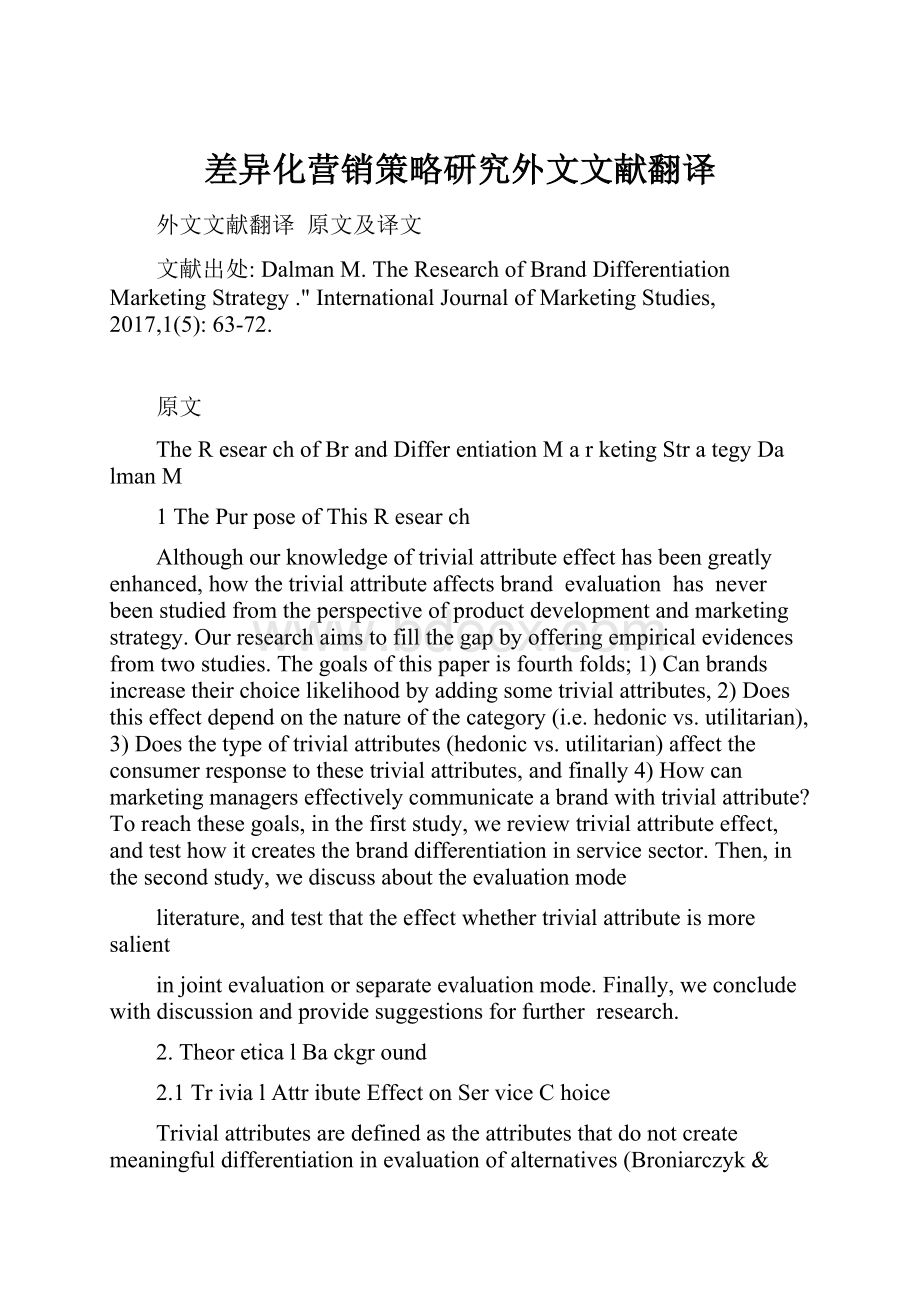差异化营销策略研究外文文献翻译.docx
《差异化营销策略研究外文文献翻译.docx》由会员分享,可在线阅读,更多相关《差异化营销策略研究外文文献翻译.docx(9页珍藏版)》请在冰豆网上搜索。

差异化营销策略研究外文文献翻译
外文文献翻译原文及译文
文献出处:
DalmanM.TheResearchofBrandDifferentiationMarketingStrategy."InternationalJournalofMarketingStudies,2017,1(5):
63-72.
原文
TheResearchofBrandDifferentiationMarketingStrategyDalmanM
1ThePurposeofThisResearch
Althoughourknowledgeoftrivialattributeeffecthasbeengreatlyenhanced,howthetrivialattributeaffectsbrandevaluationhasneverbeenstudiedfromtheperspectiveofproductdevelopmentandmarketingstrategy.Ourresearchaimstofillthegapbyofferingempiricalevidencesfromtwostudies.Thegoalsofthispaperisfourthfolds;1)Canbrandsincreasetheirchoicelikelihoodbyaddingsometrivialattributes,2)Doesthiseffectdependonthenatureofthecategory(i.e.hedonicvs.utilitarian),3)Doesthetypeoftrivialattributes(hedonicvs.utilitarian)affecttheconsumerresponsetothesetrivialattributes,andfinally4)Howcanmarketingmanagerseffectivelycommunicateabrandwithtrivialattribute?
Toreachthesegoals,inthefirststudy,wereviewtrivialattributeeffect,andtesthowitcreatesthebranddifferentiationinservicesector.Then,inthesecondstudy,wediscussabouttheevaluationmode
literature,andtestthattheeffectwhethertrivialattributeismoresalient
injointevaluationorseparateevaluationmode.Finally,weconcludewithdiscussionandprovidesuggestionsforfurtherresearch.
2.TheoreticalBackground
2.1TrivialAttributeEffectonServiceChoice
Trivialattributesaredefinedastheattributesthatdonotcreatemeaningfuldifferentiationinevaluationofalternatives(Broniarczyk&Gershoff,2003;Miljkovicetal.,2009).Consumerstreatthistrivialinformationintheadvantageofbrandsthatofferthemevenwhentheyareinformedbeforedecision-makingaboutthetriviality(Carpenteretal.,1994).BrownandCarpenter(2000)explainthisadvantagewiththereasonsbasedaccount.Theyarguethatconsumersprefertochooseonthebasisofeasilyjustified,cognitivelyavailablereasons(Brown&Carpenter,2000).Thus,whentheoptionscannotbechosenbasedonimportantattributes,consumersneedtorelyontrivialattributesthatcreatebranddifferentiation(Shafir,Simonson,&Tversky,1993).
Thequestionaboutwhattoaddtotheofferingtoincreaseitsvalueisespeciallyimportantforservices(Devlin,1998),asitismoredifficulttocreateacompetitiveadvantageinserviceindustries(Storey&Easingwood,1998).Themainreasonisthatunlikephysicalgoods,servicesareintangibleandconsumersoftenfaceaproblemofidentifying
thenecessaryattributesinservicesforevaluation.Thus,theyenduponly
relyingonbrandcomparisonsonthebasisofselectedattributes(Gabott&Hogg,1994;Rust&Chung,2006).Therefore,servicescreatemoreuncertaintyforconsumersthanphysicalgoodsatthepurchasestage.Whenadecisioncan'tbejustifiedonrelevantattributes,consumersformargumentsbasedontrivialattributesevenaftertheyaretoldaboutthetrivialityoftheattribute(Albrecht,Neumann,Haber,&Bauer,2011).Therefore,withtheamountofuncertaintyinservicesandthedifficultyofevaluatingattributesasmentionedabove,consumersarelikelytousetrivialattributeswhentheyarefacedwithanambiguouschoicesetevenaftertheyaretoldaboutthetriviality.Wepositthehypothesisasfollows;
H1:
Thechoicelikelihoodofserviceproviderthatoffersatrivialattributewillbehigherthanthatdoesnotoffer.
Comparedtophysicalgoods,servicesarebasedoninformationprocessing(Rust&Chung,2006)andhowtheinformationisprocesseddependsonwhethertheserviceisutilitarianorhedonic(Hirschman&Holbrook,1982).AccordingtoBatraandAhtola(1991),consumershavethesetwomotivesinachoicecontext.Hedonicservicesarerelatedto"fun"and"pleasure"(Babin,Darden,&Griffin,1994)whereasutilitarianservicesarerelatedto"functionality"(Strahilevitz&Myers,1998).Inachoicecontext,theoutcomesofthesetwotypesofservices
arevalueddifferentlyastheutilitarianoutcomedependsonobjective
standardswhereashedoniconesdependonsubjective(discretionary)standards(Botti&McGill,2010).Moreover,BottiandMcGill(2010)arguethathedonicmotivesaresought"asanenditself"whereasutilitarianmotivesareusedtoreachahigher-levelgoal.Wearguethatutilitarianservicesaremoreanxietyprovokingthanhedonicservicesastheyincludeimportant,hardertoachieve,anduncertaingoals(Lazarus,1991).Andinsituations,whengoalsareanxietyprovoking,trivialattributesaremoreinfluential(Xiao,Dacin,&Ashworth,2011).Therefore,weexpecttheeffectoftrivialattributestobemorepronouncedinahedonicservicecategorythaninautilitarianservicecategory.Wepositthehypothesisasfollows:
H2:
Theadvantageofserviceproviderthatoffersatrivialattributewillbemorepronouncedforthehedonicservicescomparedtoutilitarianservices.
2.2MarketingCommunicationStrategyUsingTrivialAttributeEffect
Priorliteraturehassuggestedthatcomparisonisanaturalandpowerfulstrategythatconsumersoftenrelyon(Cooke,Janiszewski,CunhaJr,Nasco,&DeWilde,2004;Dhar,Nowlis,&Sherman,1999).HseeandLeclerc(1998)suggestthatconsumerpreferencechanges
dependingonhowproductsarepresentedandevaluated,specifically,
whethertheyareevaluatedseparately(separateevaluationmode)orjointly(jointevaluationmode).Forexample,inseparateevaluationwhenoneisaskedtoratetheimportanceofsupportinggovernmentinterventionforsavingdolphinsoverpreventingskincanceramongfarmworks,thenumberofpeoplewhosupportsthegovernmentinterventionforsavingdolphinsissubstantial.However,inthejointevaluationmodewhenthesamepersonisaskedtocomparetheimportanceofdolphintothatofahumansidebyside(orjointly)themajorityofpeople'sanswerisobvioustosupportahuman.
Thus,consumersinjointevaluationmodenotonlygreatlysavetheireffortsbutalsoincreaseaccuracyinchoicebecauseitiseasiertoidentifysimilaritiesanddifferencesbetweencompetingbrands.Thisevaluationstrategyfocusingonthedifferenceorsomethinguniquemakesthetrivialattributebecomesalientandevenmeaningful(Dhar&Sherman,1996).Takentogether,wepositthatbrandwithtrivialattributewillbeperceivedmorevaluable(i.e.,peoplearewillingtopaymore)inthejointevaluationmodethanitisintheseparateevaluationmode.
H3:
WillingnesstoPay(WTP)ishigherinthejointevaluationmodethanthatintheseparateevaluationmode.
3.Discussion
Creatingbranddifferentiationhasbeencriticalmorethaneverinour
globalizedworld.Manymanufacturesofconsumerpackagegoodsmakeenormousmarketingeffortstodifferentiatetheirbrandsagainstcompetitorsoftenbysearchingandaddingnewornobleattributes.Animportantdecisiontomakeformarketingmanagersistodeterminewhatfeaturesshouldbeincluded.Inthisresearch,weintroducedanunusualbranddifferentiationstrategyusingthetrivialattributeeffect.Resultsfromtwoexperimentalstudiespointoutthefollowing;ifatrivialattributeaseasytoimplementasplayingmusicinbetweenclasssessionsforaGMATcourseordistributingfreeiceataMusicFestivalisoffered,itcanhelpserviceprovidersgaincompetitiveadvantageovertheircompetitors.Thiscanallowmanagerstobemorecreativeandstaycompetitiveinthemarket.Ourresultsalsoindicatethatthiseffectismorepronouncedinhedonicservicecategoriescomparedtotheutilitariancategories.
Fromtheethicalperspective,offeringattributesthatdon'tcreatemeaningfuldifferenceforconsumersisnotdeceivingconsumersasourresultsindicatethattheeffectsoftrivialattributesholdevenafterconsumersaretoldaboutthetrivialityofthem.Moreover,consumersindicatedinourstudythattheyarenotonlyawareofthetrivialityoftheseattributesbuttheyalsothinktheyarenotusefulintheir
decision-making.Anotherresultwefoundthatsupportsthetrivialityof
theseattributesisthatthetypeoftrivialattribute(hedonic/utilitarian)doesnotmatter.Lastly,intermsofeffectivemarketingcommunicationstrategyrelyingontrivialattributeeffect,ourresultsrevealedthatthejointevaluationmodeincreasestheconsumer'swillingnesstopaymorethanthatoftheseparateevaluationmode.
4.ImplicationsandLimitations
Ourresearchhandlesboththeoreticalandpracticalimplications;theoreticallyitwilladdtotheserviceliteraturetheapplicabilityoftrivialattributes.Whileresearchontrivialattributessofarhasmainlyfocusedondifferentconsumergoodsincludingdownjackets,compactdiscplayers,pasta(Carpenteretal.,1994),coffee,andcologne(Brown&Carpenter,2000),wearenotawareofanyresearchthathasinvestigatedtrivialattributesinaservicecontext.Inoureffortstounderstandifusingtrivialattributeswouldhaveadifferentialeffectonhedonicvs.utilitarianservices,resultssuggestthatconsumersusedifferenttypesofinformationevaluatinghedonicvs.utilitarianservices(Batra&Ahtola,1991;Holbrook&Hirschman,1982)whentrivialattributesareevaluated.
Managerially,itcanshowthemanagersapossiblyeasywaytogaincompetitiveadvantageoverthecompetitors.Considerthemusicfestivalexampleabove.Usinganequipmentfromtheplacewherethemusicwas
originatedisnotnecessarilythebestnorthemostexpensivechoice.
However,itcanpossiblygivetheorganizerstheedgeoverthecompetitorfestivalsifpeopleconsiderthisinformationpositivelyintheirdecision-making.Lastly,fromtheperspectiveofmarketingcomm